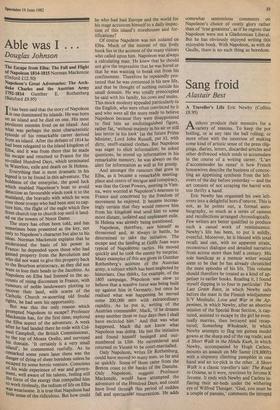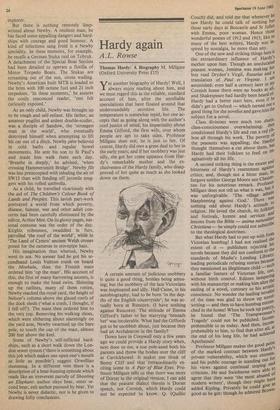Sang froid
Alastair Best
Authors produce their memoirs for a variety of reasons. To keep the pot boiling, or at any rate the ball rolling; or more often with the intention of making some kind of artistic sense of the press clip- pings, diaries, letters, discarded articles and other driftwood which tends to accumulate in the course of a writing career. Vail d'accommoder les restes' is how French housewives describe the business of concoc- ting an appetising synthesis from the left- overs of the day before yesterday — and the art consists of not scraping the barrel with too thrifty a hand.
Eric Newby has organised his own left- overs into a delightful hors d'oeuvre. This is not, as he points out, a formal auto- biography, so much as a series of cameos and recollections arranged chronologically. Few writers are better qualified to produce such a casual work of reminiscence. Newby's life has been, to put it mildly, eventful. Moreover, he is blessed with total recall; and can, with no apparent strain, reconstruct dialogue and detailed narrative from across more than half a century. His sole handicap as a memoir writer would seem to be that he has already chronicled the main episodes of his life. This volume should therefore be treated as a kind of ap- petiser to earlier books. Reading it, I found myself dipping in to four in particular: The Last Grain Race, in which Newby sails before the mast in the Finnish windjammer S/V Moshulu; Love and War in the Ap- penines, in which Newby, after an abortive mission of the Special Boat Section, is cap- tured, assisted to escape by the girl he even- tually marries, then betrayed and recap- tured; Something Wholesale, in which Newby attempts to flog ten guinea model gowns at the sharp end of the rag trade; and A Short Walk in the Hindu Kush, in which Newby, accompanied by Hugh Carless, mounts an assault on Mir Samir (19,800ft) with a sixpenny climbing pamphlet in one hand and an ice-pick in the other. A Short Walk is a classic traveller's tale: The Road to Oxiana, as it were, rewritten by Jerome K Jerome. It ends with Newby and Carless in- flating their air-beds under the withering eye of Wilfred Thesiger. 'God, you must be a couple of pansies,' comments the intrepid
explorer.
But there is nothing remotely limp- wristed about Newby. A resilient man, he has faced some appalling dangers and hard- ships with courage and good humour. A kind of infectious sang froid is a Newby speciality. In these memoirs, for example, he recalls a German Stuka raid on Tobruk. A detachment of the Special Boat Section had been detailed to operate a flotilla of Motor Torpedo Boats. The Stukas are screaming out of the sun, sirens wailing. Newby's American built MTB is loaded to the brim with 100 octane fuel and 21 inch torpedoes. 'In these moments,' he assures the cosily ensconced reader, 'one felt curiously exposed.'
As an only child, Newby was brought up to be tough and self-reliant. His father, an amateur pugilist and ardent double-sculler, was a disciple of Sandow, the 'strongest man in the world', who eventually destroyed himself when attempting to lift his car out of a ditch. Newby pere believed in cold baths and regular bowel movements. He sent his son to St Paul's and made him walk there each day. `Breathe in deeply,' he advised, 'when crossing Hammersmith Bridge'. Newby fils was less preoccupied with inhaling the air of SW13 than with fending off juvenile mug- gers with his rolled umbrella.
As a child, he travelled vicariously with the aid of The Children's Colour Book of Lands and Peoples. This lavish part-work portrayed a world from which poverty, disease, famine, war and other adult con- cerns had been carefully eliminated by the editor, Arthur Mee. On its glossy pages, nat- ional costume was the order of the day. Kirghiz tribesmen, swaddled in furs, patrolled 'the roof of the world', while in `The Land of Cymru' ancient Welsh crones posed for the cameras in stovepipe hats.
His imagination thus whetted, Newby went to sea. No sooner had he got his se- condhand Louis Vuitton trunk on board the Moshulu, than the Finnish mate ordered him 'op the mast'. His account of this, the first of many harrowing ascents, is enough to make the head swim. Shinning up the ratlines, many of them rotten, Newby reached the royal yard, the height of Nelson's column above the glazed roofs of the dock sheds ('what a crash, I thought, if I fell off'). The mate then ordered him to the very top. Removing his walking shoes, which were slithering about alarmingly on the yard arm, Newby swarmed up the bare pole, to touch the cap of the mast, almost 200 feet above the keel.
Some of Newby's self-inflicted hard- ships, such as a short walk down the Lon- don sewer system (`there is something about this job which makes one open one's mouth as little as possible') suggest Orwellian slumming. In a different vein there is a description of a bear-hunting episode which reads like an irreverent parody of Shooting an Elephant: author slays bear, enter se- cond bear, exit author pursued by bear. Yet Newby is never didactic, nor is he given to drawing lofty conclusions.





































 Previous page
Previous page